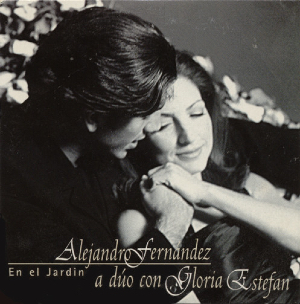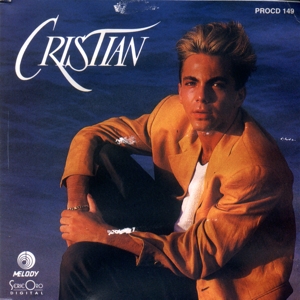
Gloria María Milagrosa Estefan is a Cuban-American singer, actress, and businesswoman. Estefan is an eight-time Grammy Award winner, a Presidential Medal of Freedom recipient, and has been named one of the Top 100 greatest artists of all time by both VH1 and Billboard. Estefan's record sales exceed 100 million worldwide, making her one of the best-selling female singers of all time. Many of Estefan's songs became international chart-topping hits, including "1-2-3", "Don't Wanna Lose You", "Coming Out of the Dark", "Turn the Beat Around", and "Heaven's What I Feel". Other hits include "Bad Boy", "Rhythm Is Gonna Get You", "Get On Your Feet", and "You'll Be Mine ".

"Let's Get Loud" is a song by American singer Jennifer Lopez for her debut studio album, On the 6 (1999). Originally written by the song's co-writer Gloria Estefan for herself, she felt as if the song was too similar to her previous material and passed it onto Lopez. Estefan, who co-wrote the song alongside Kike Santander, stated that Lopez would have "more fun with it" and would put "a new spin" on it. "Let's Get Loud" is regarded as Lopez's signature song. Estefan eventually released her own version of the song in 2011 as a bonus track on the deluxe Target edition of her album Miss Little Havana.

"Objection (Tango)" is a song by Colombian singer-songwriter Shakira for her fifth studio album and first English-language album Laundry Service (2001). It was the first song Shakira wrote in English after being encouraged by American singer Gloria Estefan to record material in the language. She also produced the track along with Lester Mendez. "Objection (Tango)" musically combines elements of pop rock and tango, and contains instrumentation from the bandoneón and guitar. Through the lyrics of the song, Shakira aims to end a love triangle she is a part of. The song was released as the fourth single from the album on 24 May 2002. A Spanish version of the song, entitled "Te Aviso, Te Anuncio (Tango)" ("I'm Warning You, I'm Telling You"), was also recorded.

Mi Tierra is the third studio album by Cuban-American recording artist Gloria Estefan, released on June 22, 1993, by Epic Records. Produced by husband Emilio Estefan, it is a Spanish-language album and pays homage to her Cuban roots. The album features Cuban musical genres, including boleros, danzón and son music. Recorded at Crescent Moon Studios in Miami, Florida, Mi Tierra features notable Latin musicians such as Tito Puente, Arturo Sandoval, Cachao López, Chamin Correa and Paquito D'Rivera.

90 Millas is the eleventh solo studio album by the Cuban-American singer-songwriter Gloria Estefan, and her fourth Spanish language album, coming after Mi Tierra, Abriendo Puertas and Alma Caribeña. It was released on September 17, 2007 by SonyBMG. All original material, the album contains a selection of various Cuban rhythms mixed with Latin-American contemporary pop.

"No Llores" is a song recorded by Cuban-American singer Gloria Estefan for her fourth Spanish-language and eleventh studio album, 90 Millas. It features additional work with popular Latin music performers such as guitarists Carlos Santana and José Feliciano, Sheila E. playing the timbales, and Arturo Sandoval on trumpet (uncredited). The song was written by Gloria Estefan and her husband, Emilio Estefan Jr. and Gaitanes, while production was credited to Estefan Jr. and Gaitanes. The single was released by SonyBMG on June 18, 2007 digitally worldwide as the lead single from 90 Millas.

"No Me Dejes de Querer" is a song by Cuban-American singer Gloria Estefan from her ninth studio album, Alma Caribeña (2000). The song was written by the artist along with Roberto Blades and her husband Emilio Estefan. The latter two also handled the song's production. It was released as the album's lead single on March 27, 2000, by Epic Records. "No Me Dejes de Querer" is a son cubano and murga song in which the narrator pleads her lover to never stop loving her. The song was met with mostly positive reviews, which found it to be an upbeat number.

"Cómo Me Duele Perderte" is a song by Cuban American singer Gloria Estefan from her ninth studio album, Alma Caribeña (2000). The song was written by Marco Flores with her husband Emilio Estefan and Roberto Blades handling its production. It was released as the album's second single by Epic Records on July 10, 2000. "Cómo Me Duele Perderte" is a salsa and bachata track that narrates the singer in pain of losing someone. The song was met with unfavorable reactions from music critics who criticized its arrangements and the singer's efforts. Commercially, the song topped the Billboard Hot Latin Songs and Tropical Airplay charts in the United States, while also peaking at number 12 on the Dance Club Songs chart in the same country and number eight in Spain. The accompanying music video was directed by Emilio, filmed in Miami, Florida, and features dramatic scenes of Estefan in front of a mirror remembering her former lover.

"Oye" is a song by Cuban American singer and songwriter Gloria Estefan. It was released by Epic in 1998 as the second single from her eighth studio album, gloria! (1998). The song was written by Estefan, her husband Emilio Estefan, Jr., Randall Barlow and Angie Chirino and produced by Estefan, Jr., Barlow and Tony Moran. However, the single still reached number one on the US Billboard Hot Dance Music/Club Play chart and in Spain. It earned the Billboard Latin Music Award in the category for "Best Latin Club-Dance Track of the Year".

"En El Jardín" is a song written by Kike Santander and performed by Mexican recording artist Alejandro Fernández. It was co-produced by Santander and Emilio Estefan and features Cuban-American singer Gloria Estefan. It was released as the second single from Me Estoy Enamorando by Sony Music Mexico in 1997. The song is a pop ballad and portrays both singers falling in love, as if the love blossomed from a garden. A music video featuring both artists was made for the track.

"Abriendo Puertas" is a song from Cuban American singer-songwriter Gloria Estefan's sixth studio album, of the same name (1995). The song was written by Kike Santander, who handled production alongside Gloria's husband Emilio Estefan. It was released as the lead single from the album on September 19, 1995. The song is a vallenato and son cubano tune that metaphorically deals with opening doors and closing wounds. Its music video features Estefan performing the song while also showing scenes of farmers planting crops. The song received positive reactions from music critics, who mostly praised the instruments. Commercially, it topped both Billboard's Hot Latin Songs and Tropical Airplay charts in the United States and peaked at number three on the Dance Club Songs chart as well.

"Mi Tierra" is a song by Cuban American singer Gloria Estefan, from her third studio album of the same name (1993). It was written by Estefano and the artist, with her husband Emilio Estefan, Jorge Casas, and Clay Ostwald handling the production. The song was released as the lead single from the album in 1993 by Epic Records. It is a son montuno track in which the singer narrates longing for her homeland. The song received positive reactions from music critics, who praised its arrangement.

"Nunca Voy a Olvidarte" is a song written by Roberto Belester and first recorded by Mexican grupero band Bronco for their album Salvaje y Tierno (1991). In the song, the protagonist is leaving and vows to never forget the time he spent with his lover. In 1993, Mexican singer-songwriter Cristian Castro covered the song on his album, Un Segundo en el Tiempo. Castro's version peaked at number-one on the Billboard Hot Latin Songs chart in the United States became his first number-one single.

Gloria is the eighth studio album by Mexican singer-songwriter Gloria Trevi. It was released on March 22, 2011 by Universal Music Latin, after a four-year gap since the release of her last studio album, Una Rosa Blu. Trevi worked as co-writer for the album tracks, while Armando Avila, Sebastián Jácome, Dr. Luke and Cirkut worked as the record producers. The themes of the songs are her personal feelings, female empowerment, survival and romantic love.

"Wepa" is a song recorded by Cuban-American singer Gloria Estefan for her twelfth studio album, Miss Little Havana. The song was written by Gloria Estefan and her husband, Emilio Estefan Jr. and by American producer and musician Pharrell Williams, while production was credited to Estefan Jr. and Williams. The single was released by Verve Forecast Records on July 24, 2011, digitally worldwide as the lead single from Miss Little Havana.

Miss Little Havana is the twelfth studio album by Cuban-American recording artist Gloria Estefan. The singer's first English-language album since 2003's Unwrapped and her twenty-sixth overall, it was released on September 27, 2011 on Crescent Moon Records, distributed by Verve Forecast and Universal Music Group. The project was largely conceived and produced by urban producer Pharrell Williams, while Estefan's husband Emilio Estefan contributed another four tracks to the album. In the US, the album was released only through Target stores.
"Inolvidable" ("Unforgettable") is a song written by Julio Gutiérrez in 1944. It is considered one of the most popular boleros released during the Cuban musical movement led by pianists. The song has been recorded by several performers, including Roberto Carlos, Diego El Cigala, Fania All-Stars, Eydie Gormé, Danny Rivera, Tito Rodríguez and Bebo Valdés, among others.

"Si Tú Supieras" is a song written by Kike Santander and performed by Mexican recording artist Alejandro Fernández. It was co-produced by Santander and Emilio Estefan and was released as the first single from Me Estoy Enamorando by Sony Music Mexico on 18 August 1997. The song is a bolero-pop ballad with ranchera influences and portrays the singer yearning for his lover to know how much she means to him. A music video was made for the track and was used as the main theme for the Mexican telenovela María Isabel.

"No Sé Olvidar" is a song written by Kike Santander and performed by Mexican recording artist Alejandro Fernández. It was co-produced by Santander and Emilio Estefan and was released as the third single from Me Estoy Enamorando by Sony Music Mexico in 1997. The song is a bolero-pop ballad with ranchera influences and portrays the singer desperately trying to forget his lover. A music video was made for the track which features Fernández hopelessly attempting to not remember his lover only to slowly delve into insanity. It received a nomination for Video of the Year at the 1998 Lo Nuestro Awards.


















